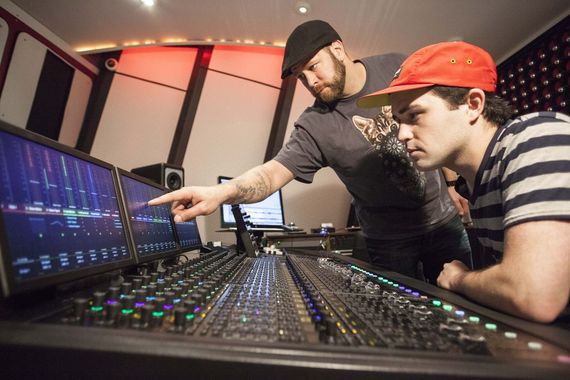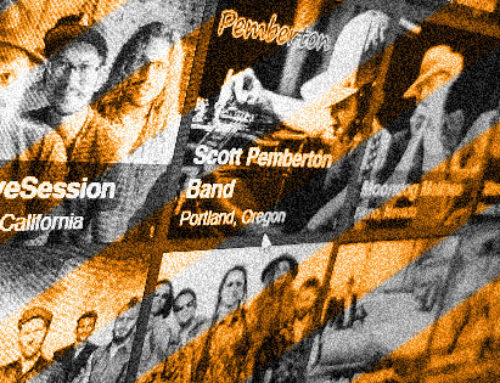So it’s time to make a record! The time has come to document what you sound like as an artist, so you can gain fans as well grow as an artist yourself. This can be an increasingly frustrating and wonderful time as an artist. The thing to remember about recording as an independent artist, is that you are in charge and no one else is backing you up. You need to be efficient, creative and determined. If it’s your first time in the studio you may find the task daunting due to inexperience, or you may be a seasoned pro. Either way, here are tips for recording as an independent artist, from an independent artist.
Johnny Harpo, Singer Songwriter and lead singer of the band Rigorous Proof shares with us his top 5 Tips for Recording as an Independent Artist.
5 Tips for Recording as an Independent Artist
BUDGET
As an independent artist you will be footing the bill completely. Think about this in a way as to not overshoot your budget for something that may or may not yield you an immediate return on investment. Meaning, you don’t need to spend $25,000 recording at the same studio Michael Jackson did for your first record when you don’t have enough fans ready to purchase your album or a tour to back up your budget. Find a studio and an engineer who you can afford, that you get along with and has examples of work they’ve done before. If it’s your first record, start with an EP (short for Extended Play, usually 3-5 songs) with the best songs you have. Record the songs you’re comfortable with, on a budget you’re comfortable with, with an engineer that you trust.
PRE-PRODUCTION
Before you even get to the studio, do you have the songs worked out in their full structure? Or is it just a riff with a couple lyrics? Ideally, you should be playing these songs live already (or at least have a working demo of them). All the members of the band should know their parts through and through. If you don’t have access to any recording equipment where you rehearse, use your smartphone. Strategically, place it in the room where you can pick up the song without it distorting too much (and where you can hear everyone ok). It doesn’t have to be perfect, you just need to be able to hear your song as a full piece. Get all your songs ready like this. You don’t want to be wasting your money trying to rehearse in the studio. Have the band sit down and talk about ideas for the things you may want to do while in the studio as well. Get a notebook and jot down things like: percussion, backup vocals, panning effects, backwards guitars etc.
PRODUCTION
Decide how you’re going to record it. Are you going to layer each piece independently by listening to a metronome? If so, are you well practiced with one? Metronomes are readily available for free on your phone. Make sure everyone in the band can play to one. It’s going to be really frustrating for everyone when your guitar player eats up 6 hours of time recording one solo because they weren’t ready and didn’t practice. The other alternative is to record it live. If you’re going to record it live you want to make sure that you’ve rehearsed enough to be able to perform the song all the way through (which again helps if you spent the time in preproduction). People have opinions either way about which is best. Some say recording it live brings out the feel of the band and makes the song breathe better, almost more organically like the music of the 50’s until the 80’s. Some believe that a metronome is better because you can make everything precise and it’s easier. You can edit out mistakes in each take to form composite takes and even loop certain elements such as the drums (since it’s all quantified). Do whatever is going to make your record the best for you and your fans.
POST-PRODUCTION
Now that your project is done it’s time to mix it and then master it. There are a couple schools of thought when it comes to mixing. Some say the engineer who recorded a project shouldn’t mix the same project. Some say it doesn’t matter. At this point in your career you can make that call. I’ve always had good luck with letting the engineer mix it, but it’s up to you and your budget. Now, you’re going to want to spend time listening to not just your mixes but critically listening to other mixes, such as your favorite records. This helps you to avoid getting listening fatigue (on your own tunes and to help with the mix as well). Once you’re satisfied with the mix it’s time to master it. A lot of people are confused by the mystical art of mastering (and what that even is). A quick search on the internet produces satisfying definitions: “Mastering; a form of audio post production, is the process of preparing and transferring recorded audio from a source containing the final mix to a data storage device (the master); the source from which all copies will be produced (via methods such as pressing, duplication or replication)”. Think of mastering as a way of making sure all of your final mixes audibly sound the same i.e.; “balanced and uniform with compatible audio levels” (you don’t want tracks that are “hotter” than each other.” Now they are ready to be on the same record. There are a variety of ways to master a track, most engineers will have a person they use (if they don’t do it themselves) or you can go online and find plenty of cheap sources that will help you.
DISTRIBUTION
Now that you have a record, it’s time to think of distribution. How will you get the music to your fans and the rest of the world? You want to think of how it’s going to benefit you and your fans. Currently there are many streaming services you must pay to be a part of and receive pennies for all your streams. Other streaming platforms such as iTunes take a nominal fee from you for a sale. You want something your fans can access easily access and you benefit from such as TuneTrax, an “Artist Centric” platform.
I hope this has benefited you in your holy quest of recording your music for the world to enjoy. The other thing to remember is to enjoy the time while you have it. Recording should be fun and stimulating, as well as challenging. Every record I’ve done, (including all my bands and songs I’ve appeared on for other artists) have been fun participating in. We play music because it’s in our hearts and souls. Our records should reflect that.
***An anecdote to remember is that Jimmy Page paid for Led Zeppelin to record the first Led Zeppelin record with his own money (as they weren’t signed to a record label yet). He owned the masters and they were in and out of the studio in under 30 hours (which was unheard of). He then took those masters and shopped them. A deal eventually landed with Atlantic records. He made good use of his time/money and kept his eye on the prize. The point to remember is, if you’re in control, use it to your advantage.***



